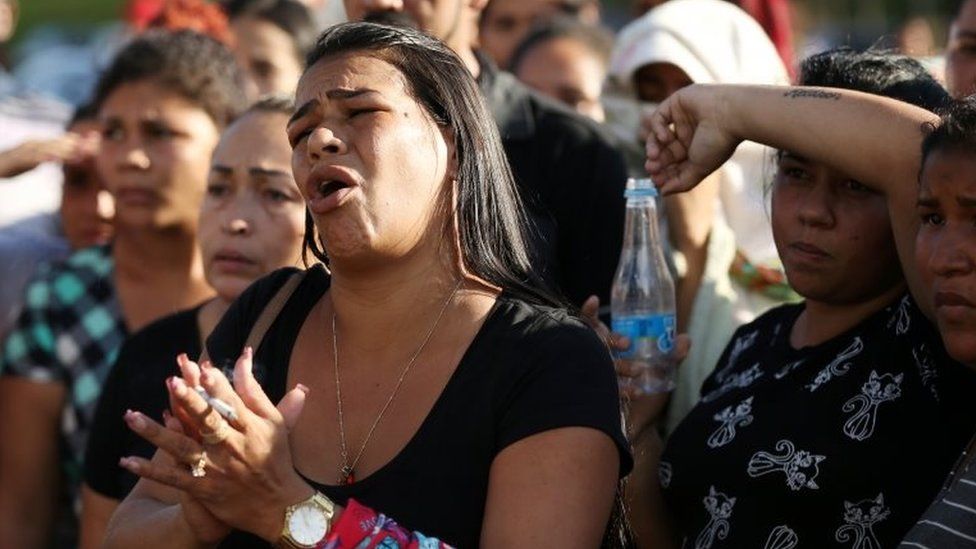Brazil jail violence: Forty killed in Manaus prisons
- Published

Relatives of inmates gather in front of a jail awaiting news after the deadly fights
Forty inmates have been found dead at four separate prisons in Manaus, the capital of Amazonas state in northern Brazil.
All the bodies, which were found during routine inspections, showed signs of asphyxiation, officials said.
Monday's violence came a day after 15 prisoners were killed in jail clashes in Manaus.
The state governor said a task force had been sent to Amazonas to help control the disturbances.
What happened where on Monday?
Antonio Trindade penal institute: 25 killed
Puraquequara jail: 6 killed
Provisional Detention Centre for Men: 5 killed
Anísio Jobim jail: 4 killed
What's behind the deaths?
Riot police entered the Puraquequara jail in Manaus, where six bodies were found
Prison officials said that the victims belonged to the same drug trafficking group and that they had been killed due to an internal gang rift.
Robert Muggah, who is research director at the Igarape Institute think tank in Rio de Janeiro, told Agence France-Presse news agency that he thought a "settling of scores" was behind the killings.
What happened on Sunday?
Fifteen inmates died in clashes in Anísio Jobim jail when prisoners turned on each other. Some were stabbed with sharpened toothbrushes while others were strangled.
The violence broke out during visiting hours and the mother of one inmate described it as "total chaos".
"Everyone started to run, and everyone was pounding on the cell gates, at the doors, and running down the corridors."
You may also be interested in:
"It was not a rebellion, it was a fight among inmates," Col Marcus Vinicius, who is in charge of prisons in Amazonas state, said.
He said the fact that the killings had happened during visiting hours broke an unwritten prison rule of "never to kill during a family visit".
Col Vinicius said murders inside jails were inevitable: "We have to have the maturity to understand that in any prison in the world, when someone wants to kill, they will kill."
What are Brazilian jails like?
Brazil has the world's third-largest prison population with more than 700,000 people in jail, not counting the more than 35,000 held in police facilities, according to data from the World Prison Brief, external.
Prisons suffer from serious overcrowding, with the number of prisoners almost double that of the official capacity.
Many prisons are run by the inmates and there are frequent clashes between rival gangs. Riots to demand better conditions and prison escapes are also common.
Attempts to reform the prison system and to introduce tighter controls have met with resistance from powerful criminal gangs which operate both inside and outside of jails.
What has the reaction been?
The crisis in the Amazonas jail system is not new. In January 2017, in the worst jail violence in Amazonas state, 56 inmates were killed in Anísio Jobim prison.
Following those killing, officials launched an investigation which concluded that there had been a number of failings at the jail.
They included a lack of communication between prison authorities and the police, which meant that the latter had not been alerted when officials found out about plans to launch a riot.
In the following days there were also uprisings and riots in other jails in Manaus.
National security forces were deployed to Anísio Jobim jail and others in the wake of the 2017 killings and, according to local media, the forces were still there when the latest killings happened.
Amazonas State Governor Wilson Lima said that the justice ministry would send a "prison intervention team" to Manaus.
In the past, rival gangs have been separated within prisons by placing them in different wings and using shipping containers to divide the prison yard.
Can these shipping containers end violence at this Brazilian prison? Andy Beatt reports
- Published25 May 2019
- Published8 May 2019
- Published2 January 2018